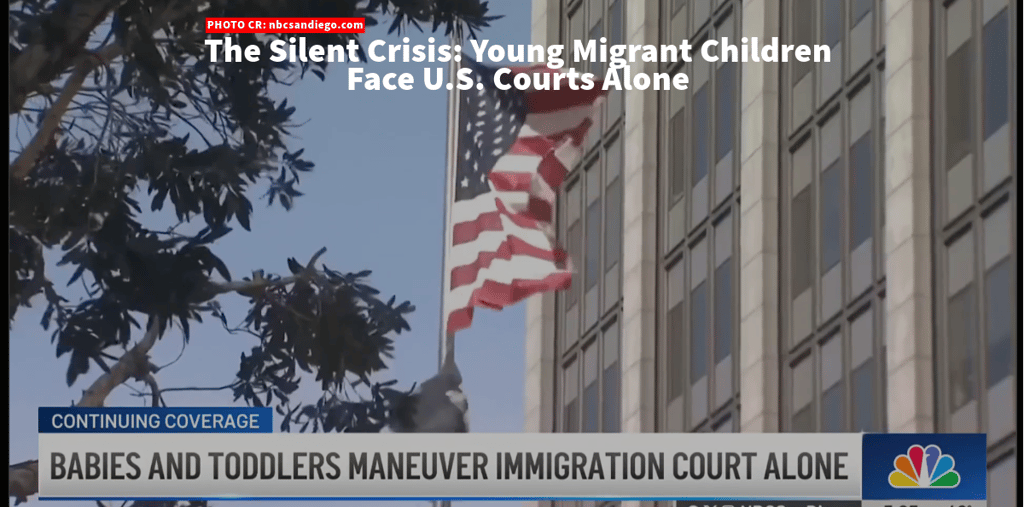The Silent Crisis: Young Migrant Children Face U.S. Courts Alone
4/17/2025


The Silent Crisis: Young Migrant Children Face U.S. Courts Alone
Imagine a five-year-old child, barely able to tie their shoes, standing before a judge in a U.S. immigration court. No parent, no guardian, no lawyer—just a small, frightened figure navigating a legal system that confounds even adults. Some of these children are survivors of trafficking or abuse, carrying scars no child should bear. Yet, despite a federal court order, the Trump administration has halted funding for legal aid that once gave these unaccompanied migrant children a fighting chance. This decision has unleashed chaos, leaving kids as young as toddlers to face deportation proceedings alone. Here’s why this matters and what it reveals about the state of compassion in our immigration system.
A Broken Promise to the Most Vulnerable
In March 2025, the Department of Homeland Security (DHS) refused to renew a contract with the Acacia Center for Justice, a nonprofit that coordinates legal aid for nearly 26,000 unaccompanied migrant children. This contract, worth over $200 million, funded attorneys who helped kids navigate the labyrinth of immigration law—attorneys who were often their only shield against exploitation or swift deportation. On April 1, U.S. District Judge Araceli Martínez-Olguin issued a temporary restraining order to restore this funding, citing the 2008 Trafficking Victims Protection Reauthorization Act, which mandates legal support for these children. Yet, the administration has not complied, defying the court and plunging legal aid groups into disarray.
The fallout is devastating. Organizations like the Immigrant Defenders Law Center have laid off staff, withdrawn from cases, and scrambled to find pro bono lawyers. Only one in five of the estimated 118,000 unaccompanied children in the U.S. has legal representation, and without federal funding, that number could plummet further. Children, some as young as two, are left to represent themselves against trained ICE attorneys in adversarial hearings.
Stories That Break the Heart
Consider “Angel,” a boy sexually abused at an Office of Refugee Resettlement facility. His attorney, funded by the now-defunded program, helped him file for asylum, report the abuse, and alert Homeland Security Investigations to his trafficking ordeal. Without legal aid, Angel might have faced deportation to a dangerous homeland, his trauma unaddressed. Stories like his are not outliers—many of these children flee violence, persecution, or trafficking, only to find themselves voiceless in a system that demands fluency in law and language they don’t possess.
In San Diego, a five-year-old Mexican girl sat before Judge Olga Attia, coloring as the judge explained her deportation case. Her feet couldn’t touch the floor, yet she was expected to grasp the stakes of her hearing. Her mother, who entered the U.S. separately, could only watch. This is the reality for thousands of children, some in diapers, others barely school-aged, who now face courts alone.
Why This Matters
The funding cutoff isn’t just a bureaucratic hiccup—it’s a moral failing. The U.S. has long recognized the vulnerability of unaccompanied minors, codifying protections in law to shield them from trafficking and ensure due process. Children with lawyers are 95% more likely to attend court hearings and far more likely to win asylum or other protections. Without counsel, they’re at risk of exploitation, deportation to danger, or disappearing into the shadows of an overwhelmed system.
The administration’s defiance of Judge Martínez-Olguin’s order also signals a broader challenge to judicial authority. Legal groups report that Trump’s lawyers have filed motions to dissolve the order, appealed it, and even asked the judge to recuse herself—all while ignoring the mandate to restore funding. This standoff raises questions about the rule of law and the government’s commitment to protecting the most vulnerable.
A Call for Humanity
This crisis demands attention, not apathy. These children aren’t just statistics—they’re human beings with stories of resilience and survival. Legal aid is their lifeline, ensuring they’re not punished for circumstances beyond their control. Restoring funding isn’t charity; it’s a legal and ethical obligation that upholds the values of fairness and compassion.
As the battle plays out in court, advocates like Wendy Young of Kids in Need of Defense urge the public to speak out. “No child should navigate this alone,” she says. The question is whether we, as a society, will demand better for these kids—or let them face the gavel in silence.
Thought-Provoking Questions:
How can a nation balance immigration enforcement with the ethical duty to protect vulnerable children?
What does the administration’s defiance of a federal court order suggest about the state of checks and balances in our system?
If you were a policymaker, how would you ensure unaccompanied migrant children receive the legal support they need?
hello@boncopia.com
+13286036419
© 2025. All rights reserved.